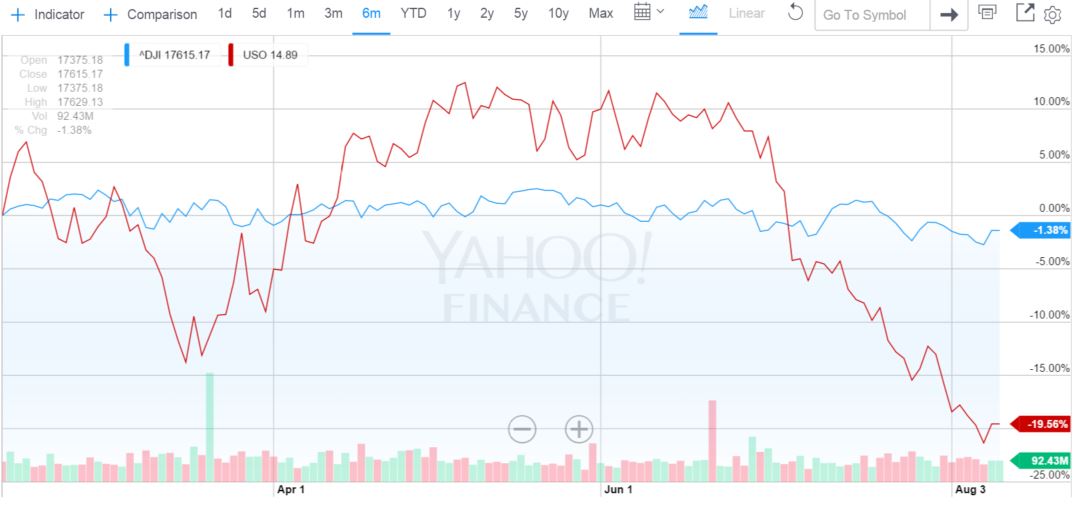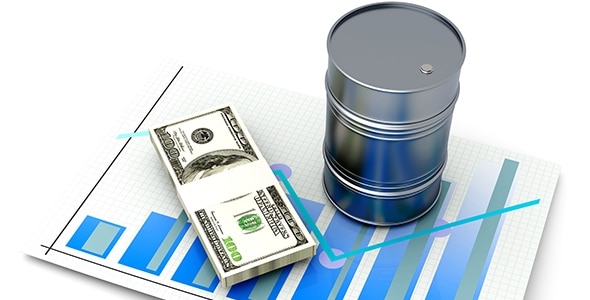Throughout the year 2015, the Dow Jones Industrial Average has traded relatively flat. Unfortunately, the mix of a strong United States dollar, low oil prices, and heavily overvalued stocks on the index have caused a slowing in the growth witnessed over the past several years.
However, that all changed on Monday as the Dow clocked its best day seen in more than three months! Ultimately, the rise in value can be blamed on the strong day that we saw from oil on Monday. So today, we'll talk about why oil rose in value and whether or not we can expect the Dow to move into a long-term bullish trend from here.
What Happened to Cause Oil & the Dow's Climb on Monday?
Ultimately, the rise in the value of oil caused the climb in the Dow, we know that much. However, what was it that caused the rise in oil? It all boils down to two big changes that took place on Monday...
- The United States Dollar Lost Value – First and foremost, when looking into the value of commodities like oil, it's important to remember that they are priced using the USD. Therefore, when the United States dollar is strong, commodities become more expensive in other nations. This causes demand to dwindle; forcing the price down in order to hinder any major supply gluts. Adversely, when the dollar loses value, demand for commodities climbs as they become more and more affordable abroad. On Monday, the value of the United States dollar fell sharply on concerns that the Federal Reserve is likely to increase interest rates in September. When interest rates rise, the dollar will lose value quickly; and since investors believe that this will happen in September, they are preparing for it now. As a result, the dollar fell; making oil more affordable and increasing demand. This was the leading factor in the spike we saw in oil's value on Monday.
- Chinese Data Showed Troubling Signs – Another factor that played a major role was disappointing economic data out of China. Unfortunately for the Chinese economy, both imports and exports fell sharply in the month of July. As a result of the disappointing economic data, more pressure is put on the powers that be in Beijing to enact economic stimulus and give the Chinese economy a boost. As a matter of fact, the economic data from July was so damning that investors expect stimulus to happen quickly. When China does put stimulus in place, demand for oil in China will likely rise as consumers and businesses alike will have more money to spend; with much of that money going to the energy sector. Therefore, this has become one of the few cases in which poor economic data leads to a rally in the value of oil.

Dow Jones (blue line) comparison to US Oil (red line) Chart: Courtesy of Yahoo News
Is the Dow Jones Industrial Average Headed for a Long- Term Bullish Trend?
That's definitely something investors want to see. After all, throughout the past 6 years, the Dow has been running with the bulls. So, it's incredibly disappointing to see the flat movement we've seen throughout most of 2015. However, I'm not sure that this spike is going to turn into a long-term trend. While China is likely to move toward stimulus, and that is likely to improve demand for oil in China, there are other issues threatening the value of oil; and therefore, the movement of the Dow Jones Industrial Average.
The most pressing of these issues is the Iranian nuclear deal. If this deal does make it past the United States Congress, it will lead to a further supply glut in the oil market; ultimately causing declines in the value of oil which are likely to bleed into the Dow Jones Industrial Average. Also, one of the factors that sent oil up on Monday could cause issues for the Dow down the road. If the Federal Reserve does indeed increase interest rates in September, investors are going to have to re-balance portfolios and avoid many of the risks that feel comfortable with lower rates. In the case of an interest rate hike, heavy resistance will hit the Dow; ultimately driving it down.
What Do You Think?
Where do you think the Dow Jones Industrial Average is headed and why? Let us know in the comments below!

















